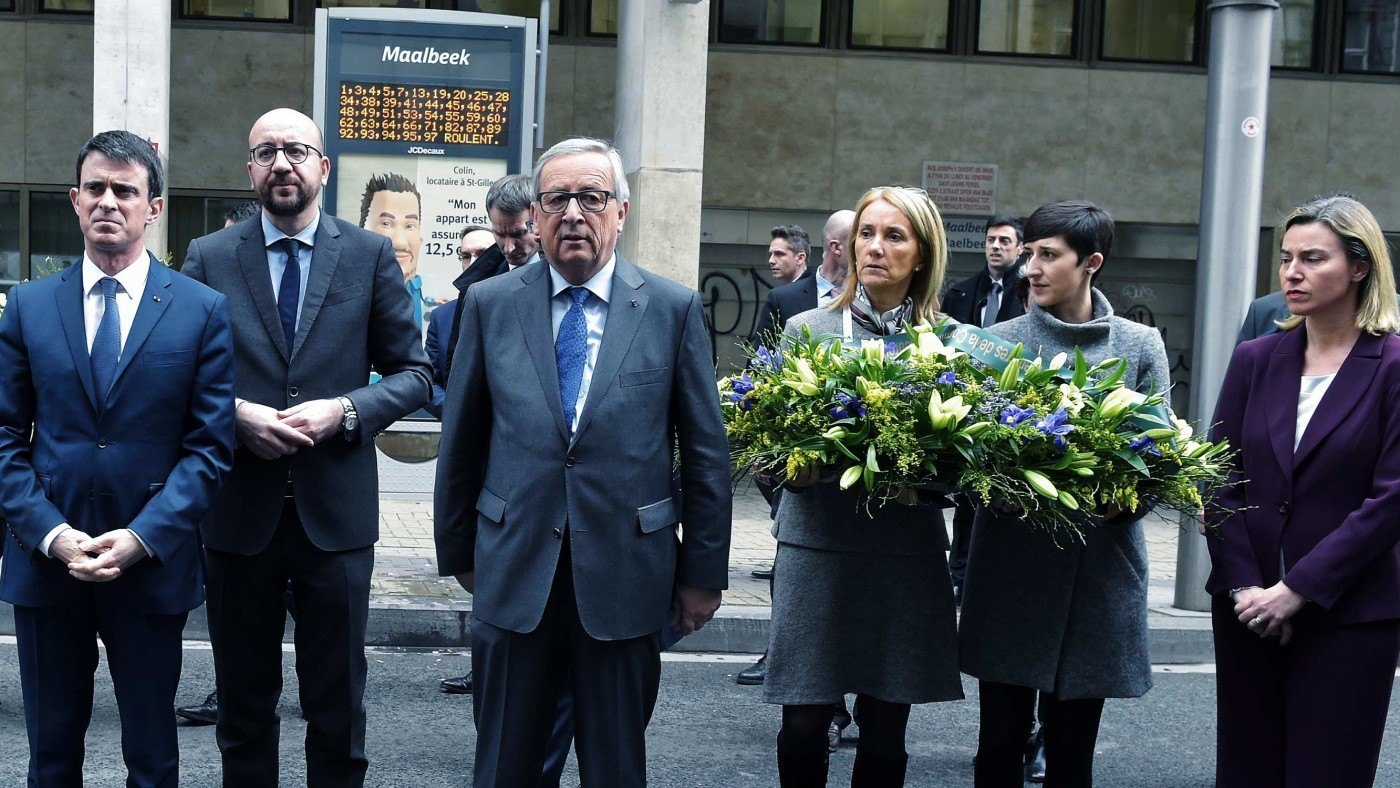A flawed syllogism has emerged from the terrorist attacks in Paris and Brussels. This is how it goes:
- The Schengen Agreement exposes Europe to terrorist infiltration.
- The Schengen Agreement is integral to the operation of the single market.
- Ergo, Britain should leave the European Union.
In respect of British security, this makes no sense. As the UK has not signed up to Schengen, it is already as “proof” against its failings as anyone could reasonably expect. Brexit, moreover, would leave us exactly where we are today – 21 miles off the coast of Belgium and France – except that not only would Calais no longer be our front line, but we would no longer be part of the intensifying EU dialogue on terrorism and thus less able than now to influence the outcome. We must not confuse the ins and outs of the In or Out debate with the ongoing war against Isis and its successors.
Nigel Farage, unsurprisingly, takes a different view. Arguing yesterday that those campaigning for the UK to remain in the European Union have “politicised” national security, he went on to complain that Schengen “led to the free movement of terrorists, of criminal gangs and of Kalashnikovs”.
A more measured judgement, but with much the same conclusion, came from Sir Richard Dearlove, a former head of MI6, who writes in the current issue of Prospect magazine that Brexit would confer the twin benefits of allowing Britain to “dump” the European Convention on Human Rights while regaining control of its borders, and therefore of immigration.
Is it worth pointing out that the human rights convention was largely a British construct, steered through the Council of Europe (itself Churchill’s brainchild) by the Tory MP Sir David Maxwell-Fyfe, later, as Viscount Kilmuir, our Lord Chancellor? Probably not.
Might it then be useful to recall that Farage has admitted more than once that those EU migrants already here, as well as any that arrive legally between now and a putative Brexit, will be allowed to remain as the price Britain would have to pay for a functioning free trade agreement with Europe? I think not.
Or what about the fact that none of the Muslims known to have committed terrorist acts in the UK came from elsewhere in the EU, but were raised and educated in Britain, with their origins in the Commonwealth? Perish the thought.
Europe is powerful in the areas of trade, agriculture and the single market. But just as it cannot intervene on the future of the NHS, state pensions, high-speed rail, education or the Budget – all issues of acute concern to UK voters – so it is unable to impose its will on matters of state security. It is an irony of the Brexit debate that one of the chief criticisms of the EU offered by Outers is that it is not doing enough as a collective to safeguard its security, preferring, by and large, to leave it to national governments and makeshift cooperation (the Leave ideal).
If the UK wants Europe to act effectively against Islamist terrorism, it should surely be advocating a dedicated intelligence organisation, with a remit far beyond that of Europol, to safeguard the security of all 28 member states. The operational side – i.e. the police and special forces – could be left to the nation states (even the Belgians), but intelligence gathering and early warning would become a joint responsibility. It would not be a perfect solution to a growing problem. Mistakes will always be made. But it would be far better than anything we have today.
Just as important would be an expanded EU Border Force, to which Britain, even outside Schengen, would make a vital contribution. MI5 and MI6 (whose briefs have a broader scope than the EU) would continue as now, but would share all relevant information and intelligence with the new central agency based, most obviously, in London.
An EU whose borders were secure and within which Big Brother was genuinely fraternal would mark a significant advance in the spirit of shared self-interest and cooperation.
Like most people across the European continent, I have been appalled by the the Islamic waves breaking on Europe’s shores. it is one thing to feel human sympathy for the dispossessed and the desperate, quite another to organise, whether by accident or design, the gradual transfer of the Muslim populations of the Middle East and beyond to Europe. David Cameron, while he still can, should embark on an urgent campaign within the EU to adopt the British strategy of aiding refugees in situ, rather than encouraging them in their hundreds of thousands to settle in Europe. I doubt his plea would fall on deaf ears. In this context, the latest deal with Turkey looks to be both half-baked and over-cooked, allowing Turkey, in thrall to an increasingly ruthless dictator, to gain advantage from the present crisis while giving next to nothing in return.
You don’t have to be a bleeding heart to be a good European. It is enough to have a heart that pumps blood to the brain as much as to other organs.
One thing is certain: we cannot go on as we are now. When the blast of war blows in our ears, then imitate the action of the tiger; stiffen the sinews, summon up the blood. In other words, do something. Europe should finally get its act together not only on security but on foreign and defence policy so that, while defending the weak and championing the defenceless, it moves to push back the Islamist tide and once more proclaim Europe as a civilisation in its own right, with an ancient history, that is not about to surrender its culture, or its birthright, to atone for the manifest failings of the Muslim World.
We hang together or we hang separately.


